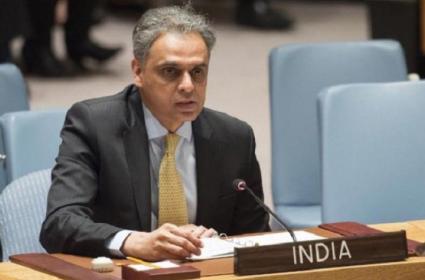India Blocks Pak Move To Raise Kashmir at UN

United Nations: While countering Pakistan's latest attempt to raise the Kashmir issue at the Security Council, India has said that it hopes the new government of Prime Minister Imran Khan would work constructively to build the region and free it from the scourge of terrorism.
"Pacific settlement (of disputes) requires pacific intent in thinking and pacific content in action," India's Permanent Representative Syed Akbaruddin said Wednesday at the Council suggesting a new approach for the new government.
"Regurgitating failed approach which has long been rejected is neither reflective of pacific intent nor a display of pacific content," he emphasised after Pakistan's Permanent Representative Maleeha Lodhi suggested the Council should resuscitate initiatives on Kashmir from 70 years ago. "We hope that the new government of Pakistan will, rather than indulge in polemics, work constructively to build a safe, secure and developed South Asian region free of terror and violence," Akbaruddin said.
Also Read: Pakistan Troops Violate Ceasefire In Jammu And Kashmir’s Poonch
The session on mediation and settlement of disputes was presided over by Tariq Mahmood Ahmad, the British Minister of State for the Commonwealth and the UN. Lodhi referred to decades-old failed Council efforts and invoked the 1948 Council resolution setting up the UN Commission for India and Pakistan (UNCIP) for investigating and mediating the Kashmir dispute.
However, UNCIP in a resolution on August 13 that year clearly stated that the Pakistan government "agrees to withdraw its troops from that state" and "endeavour to secure the withdrawal" tribesmen and Pakistanis "who have entered the state for the purpose of fighting." Islamabad has failed to keep that assurance and ironically, Lodhi asserted that the Council's failure to resolve the Kashmir dispute put its credibility was at stake. The UNCIP admitted in 1949 its failure to mediate the dispute and closed down.
Akbaruddin questioned if the UN and the Council were even capable of mediating disputes, asserting that they were hobbled structurally and would not come to the mediation process "unencumbered."
Also Read: Heavy Pakistan Shelling In J&K Kills Civilians
The Council's permanent members had veto powers and without their full cooperation mediators cannot act effectively, he said. Moreover, the "tortuous decision-making process, imbued with political trade-offs saps the UN of necessary dynamism and flexibility in pursuing mediation" and makes responses to changing circumstances in the mediating process difficult, he added.
Therefore, he said, "upgrading, expansion, or revamping of (the UN) Secretariat rules and regulations" would not work and it would "be more realistic to look at functional solutions rather than structural ones". "Rather than try and throw in the UN lap intractable issues, perhaps, a more pragmatic approach is required," he added, suggesting that the world look at "alternate solutions which use the competencies of the UN more judiciously".
(IANS)























